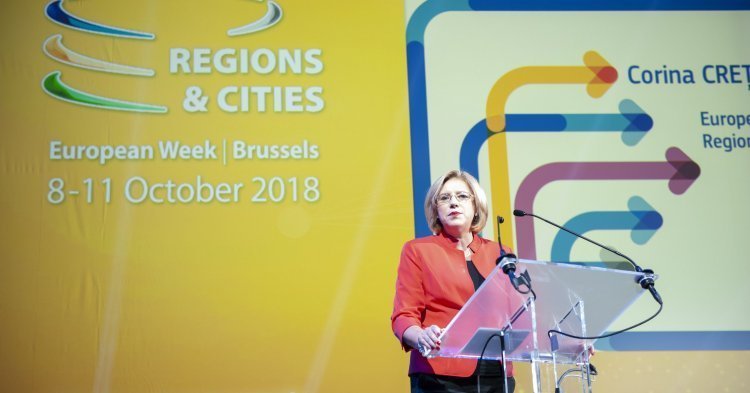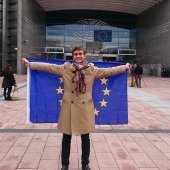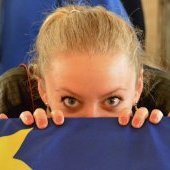More than 6,000 participants and 300 partners participated in the European Week of Regions and Cities that took place from 8 to 11 October in Brussels. Closed by the European Commissioner for Regional Policy, Corina Crețu, and the President of the Committee of the Regions, Karl-Heinz Lambertz, the 16th edition of the event enabled more than 140 regions and cities to display their willingness to improve cohesion and debate in their territory in 2018, the year marking the 30th anniversary of the EU cohesion policy.
RegioStars: Awards aiming to promote innovation and cohesion
During the European Week of Regions and Cities, RegioStars were awarded. These prizes seek to highlight regions that promote best practice and successful changes of approach. There are four fixed categories for the awards.
The “Supporting smart industrial transition” award was won by the Portuguese city of Fundão, in the Centro Region, thanks to its Business and Shared Services Centre. The project aims to combat the demographic and economic decline by supplying IT and infrastructural competences to enterprises and start-ups.
The “Transition towards a sustainable, low-carbon economy” award was given to the Finnish region of Helsinki-Uusimaa for its TeKiDe project, recycling textile fibre in order to manufacture quality fabric out of poor-quality cotton. The “Better access to public services” award was dedicated to the Czech Moravian-Silesian region for its renovation project of 105 apartments and the establishment of a cooperation network between different districts in the city, as well as social support for tenants.
The “Addressing the migration challenge” award was won by the Spanish region of Murcia for its actions for refugees through personalised plans, a ‘one-stop-shop’ where they can get support, and a variety of language courses to help them integrate. In addition to the fixed categories, there is a category that changes every year: “Investing in cultural heritage” was the theme of the year 2018, connecting with the European Year of Cultural Heritage! This public choice award was granted to the Vista Alegre Heritage Museum in Ilhavo, Portugal, that traces 200 years of history of the production of porcelain in the region.
Corsica: The green island of the Mediterranean?
Among the numerous roundtables taking place during the week, one discussed the partnership of “Green islands for sustainable cohesion policy” created between Corsica, Sardinia, the Balearic Islands and Crete. The cooperation between the Mediterranean islands started from the idea of promoting sustainable development of insular locations and sustaining green growth.
The ecological transition in the Mediterranean islands has, as such, been carried out through networking between actors in local development, comparing the systems and adopting a common model that is more efficient than the previous ones. Being on an island requires even more rigour, as cohesion policy is confined to a space that is sometimes more hostile than what you find on the Continent. Through this partnership, the identification of best practices has helped to guide tomorrow’s strategies concerning sustainable tourism, and the valuing and revitalising of the rural environment, agriculture and transport.
Concerning the implementation of the policies, Corsica was already at the heart of projects concerning renewable energy and the promotion of natural and cultural resources in the 2014 - 2020 period. The strategy of sustainable growth presented during the European Week of Regions targeted the use of marine energy with, for example, a project on digital tools which facilitate mobility within a cluster of municipalities.
The differences between the four partners are at the same time a boost and an obstacle to setting up this kind of a cohesion policy. While the Balearic Islands have their own institutional capacity, Corsica is subject to fiscal and regulatory rules that apply to the metropolitan regions of France. Beyond economic issues, it’s above all the environmental costs that force island territories to manage their ecosystems intelligently in order to cope with large influxes of tourists.
In the framework of Interreg Marittimo, the four partners don’t necessarily work directly with each other, given the distance between them. Even so, meetings are held to jointly promote circular economy, that is an economy organised so that waste from one activity (heat energy, rubbish, wastewater etc) is reused as a factor of production in another activity. The geographical constraints of these territories need to be countered by innovative solutions that turn these limitations into an advantage. The partners are also focused on the blue economy. Seeking to reduce the environmental footprint, the blue economy generates jobs and a sense of ecological responsibility at all levels so that the citizen is made directly aware of the challenges of living on a Mediterranean island.
Momentum for regionalisation at universities
As a place for exchanging viewpoints and creating networks between students, university employees, administration and partners; the universities are an essential motor for promoting new research and, a fortiori, concepts related to regional and urban policies. This dynamically democratises the EU’s cohesion policy and fosters its better comprehension thanks to numerous thinktanks. During this week, debates discussed the following themes, for example:



Follow the comments: |
|
